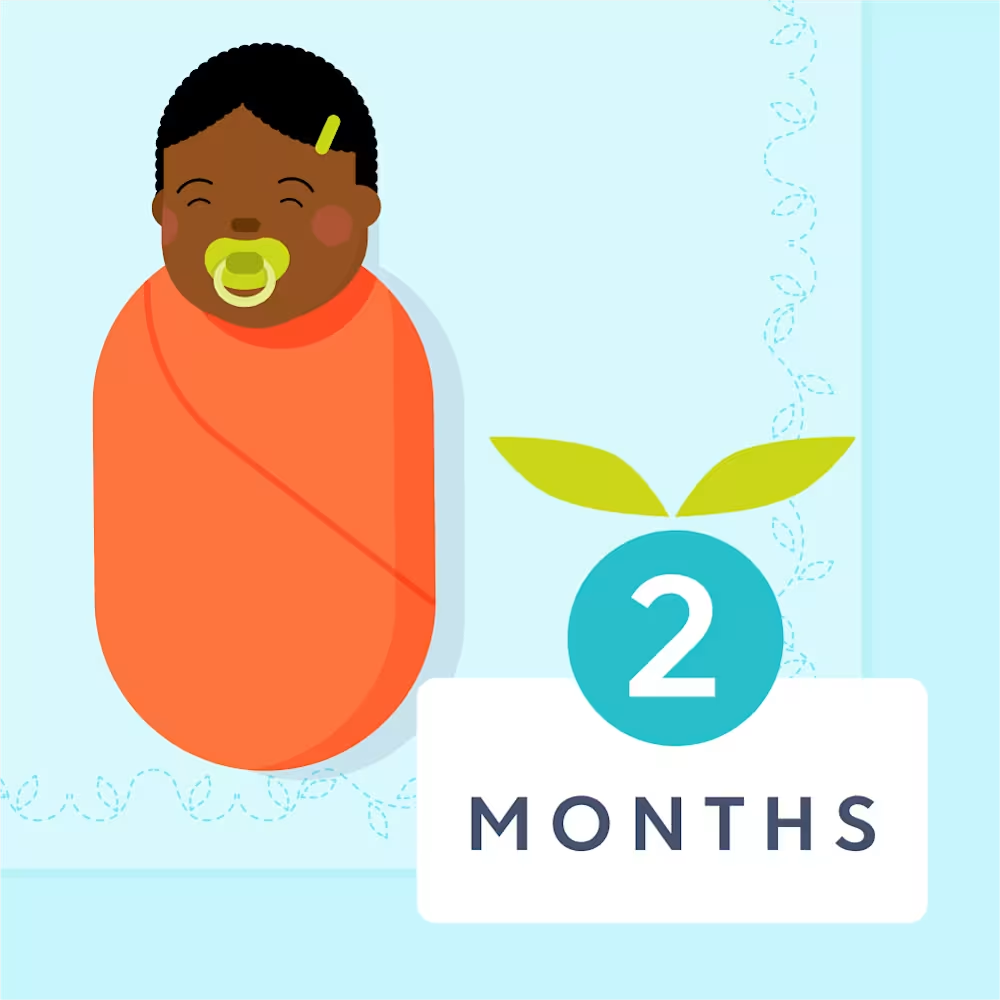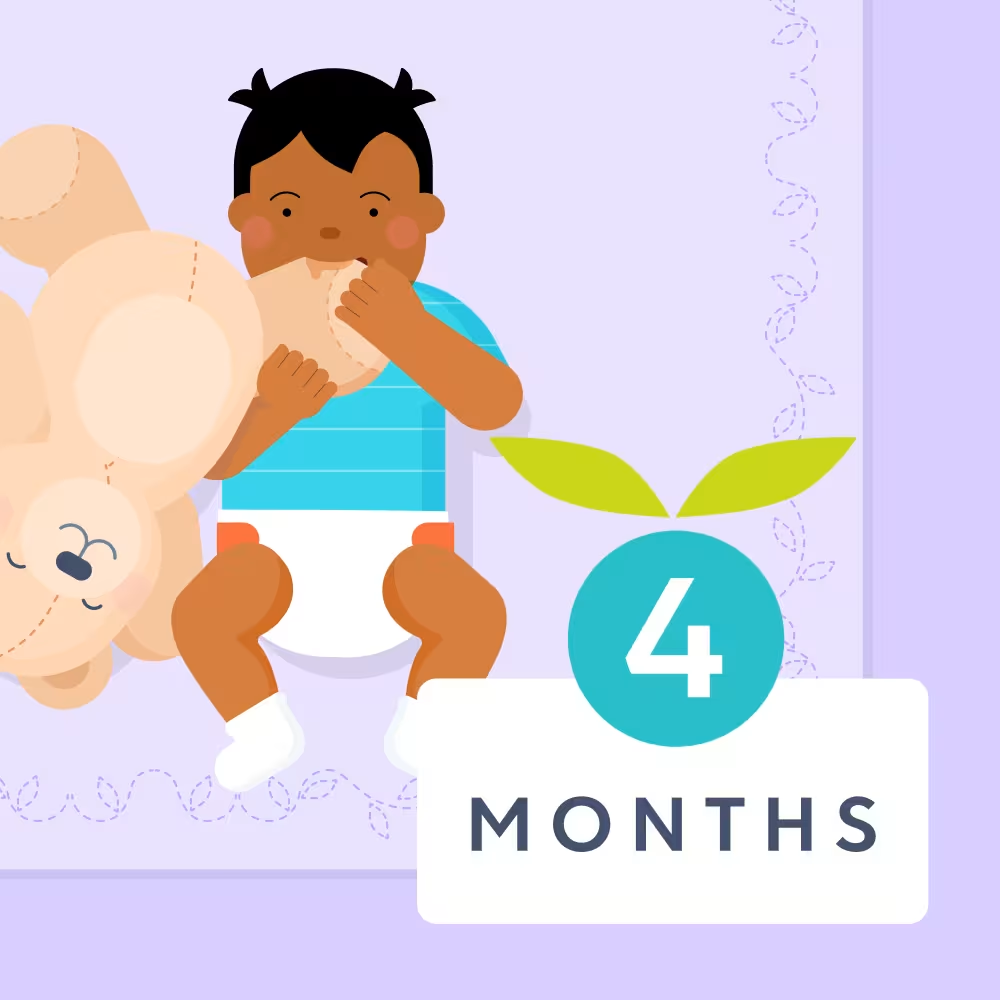5 month sleep regression: Myth or real?
Updated Dec 15, 2025

Does it feel like every time you turn around it seems like you’re clamoring to figure out why your baby isn’t sleeping well… again? Is it a 5 month sleep regression? Is it teething? Is it the moon?! In all seriousness, we understand that baby sleep issues are tricky to navigate. At 5 months it’s not uncommon for your little one to still be experiencing short naps and overnight wakes, even if you’re doing everything “right.”
In this article, we’ll help you spot sleep regression signs, give you tips for handling nap regressions, and give you resources for helping your child learn to sleep independently and begin to be able to link sleep cycles on their own, which can lead to improved sleep.
If you’re looking for a little extra support in the sleep department, whether or not your little one is in a sleep regression, consider submitting for a sleep plan through . Our step-by-step plans are tailored to help your child’s sleep get back on track plus you’ll get access to our SweetSpot sleep predictor that notifies you when it’s likely time for them to sleep after an age-appropriate wake window.
Is there a 5 month old sleep regression?
While you may have heard that sleep regressions happen at predetermined ages, it’s a little more complicated than that because sleep is impacted by so many factors. Instead, we define a “” as a sudden, significant worsening of sleep patterns. This can happen at any age and may look like fighting sleep, short naps, increased waking overnight, etc. when your little one had been sleeping well previously.
It’s possible that your 5 month old is still experiencing sleep issues after their sleep cycles and stages change around 3-4 months. The “” occurs when a little one’s sleep architecture matures and they begin to sleep in stages of light and deep sleep, similar to an adult. After this, it’s common to feel like your baby is suddenly not sleeping, with short naps and more frequent wakings overnight.
Why do 5 month old babies have sleep issues?
Reason #1: Sleep can still be unpredictable at 5 months
If your little one is still experiencing short naps and overnight wakes, rest assured this is common . It’s not just your baby! It can take time (and practice) for your baby to learn to link sleep cycles after their sleep matures at around . There are ways to help your child learn to fall asleep independently that may help with sleep issues at 5 months, and we’re .
Reason #2: Developmental milestones
When your baby is working on new, exciting developmental milestones this can temporarily disrupt sleep []. At 5 months, your little one is likely rolling from front to back or back to front — or maybe both! This new mobility is a big change and it may take a few weeks for your baby to adjust so they can go back to focusing on sleep instead of their new skill.
Reason #3: A schedule adjustment is needed
If your 5 month old is fighting sleep and you’ve ruled out factors like , they may be ready for longer wake windows instead. Try to increase the amount of time they’re awake to to see if this helps lengthen naps and get sleep back on track.
On the other hand, if your baby is napping “too much” this can interfere with upcoming naps and overnight sleep. We recommend limiting individual naps to 1.5 - 2 hours, and total day sleep to 3 - 4 hours) for this reason. Most babies sleep best with at this age.
Reason #4: Discomfort
Illnesses, teething, and general discomfort can wreak havoc on baby sleep! A good way to tell if your kiddo is uncomfortable or in pain is if they wake up mid-cycle overnight (meaning they wake sooner than 40 - 50 minutes after falling asleep).
My 5 month old won’t nap so is this a sleep regression?
“Sleep regression” is a term that commonly refers to a sudden decline in sleep habits, which can certainly happen during the day. Short naps and refusing daytime sleep at this age is often due to needing a schedule adjustment. You might try lengthening wake windows to 2 - 2.5 hours to see if that helps lengthen your 5 month old’s naps.
Overall naps can still be tricky (and short!) at 5 months if your baby isn’t able to link sleep cycles independently yet. Babies who fall asleep on their own, without parental support, are more likely to have longer naps. However, it’s still common and age-appropriate to have a daily catnap until the third nap is dropped (typically by 8 - 9 months old).
If you’re rocking, feeding, or otherwise regularly, this sleep onset association may be contributing to short naps and overnight waking. Of course, there’s nothing “wrong” with helping your little one to sleep — sleepy snuggles are so precious. However, if your goal is to have your baby sleep for longer stretches of time during naps (and at night), you may consider teaching them to instead.
How long do 5 month sleep problems last?
You may be frantically Googling, “How long does a 5 month sleep regression last?” However, this depends on the cause and the strategies you’re using to get sleep back on track. For example, if a child’s sleep issues are caused by the mastery of a new milestone, then nighttime sleep may be impacted for a couple of weeks and subside after the initial excitement of practicing rolling passes. On the other hand, if a child’s sleep has worsened due to a sleep onset association, sleep may not significantly improve without changing the way they fall asleep.
When does it start?
While there isn’t a prescribed start date for most sleep regressions, here are some sleep regression signs that may be happening at 5 months:
Night sleep is suddenly worse
Baby is fussy during sleep times and has difficulty settling down
Naps are shorter and baby is sleeping less during the day
When does it end?
Just like there’s not a definite start date for sleep regressions in 5 month olds, there’s not a cut-and-dry end date either. If the regression is sparked by an illness or developmental milestone, you might expect a short period of disrupted sleep. If your baby isn’t falling asleep independently or linking sleep cycles on their own yet and then experiences new sleep challenges, you may find that this period of rough sleep lasts longer — weeks or months, depending on a .
4 tips to handle 5 month old sleep issues
Tip #1: Follow age-appropriate wake windows
While tweaking your baby's sleep times isn't a magical sleep regression solution, it can make things a bit smoother. For instance, you want to ensure your little one is tired enough to sleep, but if they cross into overtired territory, this can lead to more crying at bedtime, short naps, and more frequent night waking. Following an age-appropriate sleep schedule based on can be a good way to prevent overtiredness and set your little one up for success when it comes to sleep.
For instance, if your child is taking at 5 months, you’d expect 1.5 - 2.5 hours of awake time between naps or before bedtime. Once they and take 3 per day, wake windows typically increase to 2 - 3 hours.
Tip #2: Create an ideal environment for sleep
If you haven’t already, try setting up your child’s sleep space to be dark at night and during the day. There are tons of products on the market for doing this: blackout curtains, portable blackout shades, and blackout blinds, for starters. These options are great because if a room is too light, a baby may get distracted and fully wake up when they briefly rouse after one sleep cycle, instead of drifting off to sleep again.
Also, try using background noise (usually in the form of ). Sound machines are great at muffling household noise, especially during the day, which can help your baby get in good naps.
Tip #3: Move bedtime earlier if naps have been short
Some days sleep is just hard! We get it. If your little one has taken especially short naps or skipped a nap for whatever reason — teething, illness, schedule changes, etc. — consider moving your kiddo’s bedtime earlier that day. can lead to even more sleep challenges at night, especially when you're dealing with a "5 month sleep regression," so try moving their bedtime routine 15 - 30 minutes earlier than normal.
Tip #4: Help baby learn the skill of self-soothing
If you’re considering sleep training at 5 months to help your child learn the skill of self-soothing, there are . Some are more gradual and aim to reduce crying, while others can work faster and may involve more tears.
Note that sleep training results . If a baby already has established sleep routines, you may find they respond well to sleep training. Other babies may need more time to develop their own sleep patterns. Every baby is different and it’s important to pick a method that aligns with your baby’s needs as well as your family’s goals. The important part is helping your baby learn how to fall asleep with less of your help if that’s your objective!
How much sleep does a 5 month old need?
We recommend striving for about 14.5 hours of total sleep over a 24-hour period. This typically looks like 11 - 12 hours at night, and 2.5 - 3.5 hours during the day spread out over 3 - 4 naps. Remember, when it comes to baby sleep, there's a range of normal and that’s expected!
Some babies need more or less sleep than this. We recommend paying attention to your child’s mood and energy levels when determining if they’re getting the shuteye they need.
How can I tell if it's teething or 5 month sleep problems?
According to the American Academy of Pediatrics (AAP) [], children may get their first tooth as early as 3 months, though many babies get their first chomper closer to 6 months. If you suspect your infant is teething at 5 months, it’s very possible! A study [] found that teething symptoms tend to occur over 8 days: 4 days before a tooth emerges, the day the tooth pops through the gum, and the 3 days following it.
can cause sleep disruptions temporarily but note that it’s not as simple as your baby is either teething or going through a sleep regression. Instead, teething is one of many factors that can impact sleep at this age.
How can I tell if it's separation anxiety or 5 month sleep problems?
Around 5 months, your baby may start to show early signs of or stranger anxiety. This is when babies begin to clearly recognize familiar caregivers versus new faces and may become more aware (and upset) when you’re out of sight.
These new social and emotional developments can sometimes show up as sleep struggles. Your little one might be extra fussy at bedtime if someone new is putting them down, take shorter naps, or wake more often overnight looking for comfort. However, there are plenty of other reasons that sleep may be rough at 5 months.
Since it’s hard to pinpoint a single cause and definitively say if it's separation anxiety or general sleep issues, focus on supporting your baby through this stage with consistent routines, plenty of reassurance, and realistic expectations.
Can you sleep train during a sleep regression?
Sleep training results at can vary widely. Some babies may have already developed more consistent sleep routines and respond well to sleep training techniques, while others may not quite be there yet. Either way, it’s normal for progress to be a bit up and down at this stage. If you choose to begin sleep training, think of it as giving your baby the chance to practice independent sleep skills — they might not master them just yet, and that’s OK.
The American Academy of Pediatrics (AAP) recommends placing your baby in their sleep space while they’re drowsy but still awake, starting around 4 months old. This approach helps babies learn to fall asleep on their own, which can lead to fewer night wakings — and more restful nights for the whole family. If you haven’t tried this yet, now may be a good time to get started if you’re ready. If you’re not, that’s perfectly fine too! Sleep training is a personal choice and only you can decide what’s right for your situation.
Can I let my 5 month old cry it out during a sleep regression?
By , most babies are developmentally ready for some form of sleep training, but the “best” approach depends on your family’s goals and comfort level. Gentle strategies, like gradual withdrawal or pick-up-put-down, can be a great fit at this age and help babies practice falling asleep more independently — even if your baby is in the midst of a sleep regression at 5 months.
More intensive methods, such as total extinction (“cry it out” with no check-ins), are usually not recommended for babies at this age. Many infants at 5 months still need some support, especially overnight. If you opt for this method, we strongly suggest close monitoring. Use a video monitor and conduct regular safety checks at least once every hour to ensure your little one’s well-being.
Before starting any sleep training method, it’s important to consider your baby’s overall health and development, and check in with your pediatrician if you have any concerns.
What are self-care tips for tired parents?
Divide and conquer: If possible, divide nighttime responsibilities with a partner or trusted helper — even short, uninterrupted stretches of sleep can make a huge difference in how you feel the next day.
Lower the bar: It’s OK to put off non-essential tasks for now. If the dishes pile up or laundry takes an extra day, that’s OK. Prioritize rest, nourishment, and time with your baby — the rest can happen later. We know that’s often easier said than done!
Phone a friend: Even a quick text exchange, voice note, or short call with someone who gets it can do wonders for your mood. Sharing a laugh or venting about a rough night helps remind you that you're not in this alone and it will get better.
Should I let my baby sleep in my bed during a regression?
The AAP strongly advises against bed-sharing with your baby []. If you bring your little one into bed for a feeding or some snuggles, they recommend returning them to their own safe sleep space — like a crib or bassinet — before you fall asleep. It’s especially important to avoid dozing off with your baby on couches or recliners, where the risk of infant death is significantly higher [].
When to talk to a doctor
It’s normal for your child’s sleep patterns to ebb and flow as they grow — sleep isn’t linear! However, if you notice some red flags when it comes to their sleep, it’s a good idea to talk to their healthcare provider. Here are a few examples of when it might be time to reach out:
Feeding or weight gain concerns: If your baby is consistently skipping feeds, having fewer wet diapers, or isn’t gaining weight steadily, reach out to their doctor. If you’re breastfeeding, a lactation consultant can help.
Excessive fussiness or signs of pain: If your baby seems unusually fussy, inconsolable, or you think they’re in pain, there could be an underlying issue like illness, reflux, or an ear infection.
Additional symptoms: Fevers, rashes, vomiting, or coughing aren’t typically associated with sleep regressions.
Too much sleep: If your baby is unusually drowsy, hard to wake, or sleeping far more than usual, it’s worth checking in.
Gut feeling: You know your baby best. If something doesn’t feel right, it’s always OK to trust your instincts and reach out.
Takeaway
Sleep regressions can happen at any age. If your baby is suddenly going through a phase of poor sleep (like more frequent night waking or short naps) we’d call this a “regression.” However, there aren’t magical dates on the calendar that dictate when sleep will go down the drain for all babies.
At 5 months, your little one may still be sleeping poorly after the biological shift in the way that they sleep that happens at 3 - 4 months. This is often dubbed the “4 month sleep regression” and may still be impacting your baby’s sleep at this age. Contributing factors like teething, travel, illness, etc. may also lead to new sleep challenges.
Consider helping your infant practice falling asleep independently at this age. When babies can drift back to sleep when they wake overnight, this typically improves sleep for them — and you.
Share article:
Note: The content on this site is for informational purposes only and should not replace medical advice from your doctor, pediatrician, or medical professional. If you have questions or concerns, you should contact a medical professional.
5 Sources
Share article:





